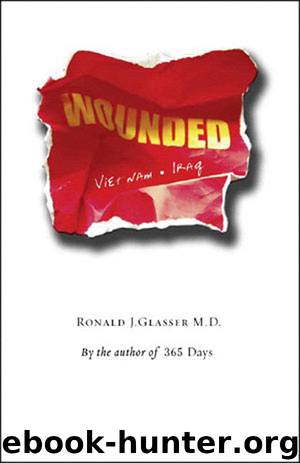Wounded by Ronald J. Glasser

Author:Ronald J. Glasser
Language: eng
Format: epub
Publisher: George Braziller Inc.
Oaths
“How the hell did all this happen?”
—WOUNDED MARINE,
TET OFFENSIVE, MARCH, 1968
There has been something a bit off about this war from the beginning, that went beyond the “bait and switch” from Afghanistan to Iraq, the lack of Weapons of Mass Destruction and the fact that there was no connection between the attack on the World Trade Center and Saddam Hussein.
It is that sense of the backyard bully, that “Bring ’em on” and “Bin Ladin Dead or Alive,” that seemed unnecessary and worse, dangerous.
But still it is one thing to beat your chest and think you are the biggest kid on the block and quite another to go about trashing the rules that hold the neighborhood together. Efforts have been made throughout history to eliminate or, at least, control the excesses of warfare. The theories of the “Just War,” the Geneva Conventions, the Red Cross and Red Crescent Accords, and the Uniform Codes of Military Justice are all attempts to keep war from spilling over the edge. Despite what the uninitiated might say, out in the desperateness of the battlefield there is all the difference between the merciless and the pitiless.
There was a communication, perhaps apocryphal, but widely believed and discussed, between Robert E. Lee and President Abraham Lincoln at the beginning of the Civil War. A company of Federal cavalry, working as a detached unit, was captured by the Confederates, and the orders carried by the captain of the company sent on to Robert E. Lee.
The orders were as ruthless as they were specific. The cavalry was given carte blanche to wreak havoc throughout the South. Their orders were to burn, to maim, to pillage, and to kill. These orders were so clearly outside the accepted rules of engagement that Robert E. Lee sent them on to Lincoln with a note that asked basically, is this the kind of war you want? Lincoln answered no, that this was not the kind of war that he nor anyone else in the Union wanted, and he made that perfectly clear to his own Department of War.
Lincoln understood that even in war there were lines that should not be crossed. He realized that someday the nation would have to be put back together again and that how the war was fought would, in the end, be as important as how it was won.
This administration apparently holds no such view. Restraint is not part of its politics nor policy; the Geneva Conventions are said to no longer apply; the president is said to have unlimited powers to fight the “War on Terror”; tribunals are to replace civilian as well as military courts, the Patriot Act, memos from the highest levels of the Justice Department authorizing “harsh” interrogation techniques, the bellicose landing of a president on aircraft carriers, “Preventive War,” Abu Ghraib, Guantánamo—the list goes on.
A military, though, is never comfortable with the dimming of legal distinctions and blurring of established and official boundaries. Vagueness in military orders inevitably means approval or consent. Whether captain,
Download
This site does not store any files on its server. We only index and link to content provided by other sites. Please contact the content providers to delete copyright contents if any and email us, we'll remove relevant links or contents immediately.
| Africa | Americas |
| Arctic & Antarctica | Asia |
| Australia & Oceania | Europe |
| Middle East | Russia |
| United States | World |
| Ancient Civilizations | Military |
| Historical Study & Educational Resources |
The Radium Girls by Kate Moore(12003)
100 Deadly Skills by Clint Emerson(4899)
Rise and Kill First by Ronen Bergman(4758)
The Templars by Dan Jones(4672)
The Doomsday Machine by Daniel Ellsberg(4473)
The Rape of Nanking by Iris Chang(4189)
Killing England by Bill O'Reilly(3986)
Stalin by Stephen Kotkin(3939)
Hitler in Los Angeles by Steven J. Ross(3935)
12 Strong by Doug Stanton(3539)
Hitler's Monsters by Eric Kurlander(3317)
Blood and Sand by Alex Von Tunzelmann(3180)
The Code Book by Simon Singh(3161)
Darkest Hour by Anthony McCarten(3112)
The Art of War Visualized by Jessica Hagy(2986)
Hitler's Flying Saucers: A Guide to German Flying Discs of the Second World War by Stevens Henry(2739)
Babylon's Ark by Lawrence Anthony(2659)
The Second World Wars by Victor Davis Hanson(2510)
Tobruk by Peter Fitzsimons(2493)
